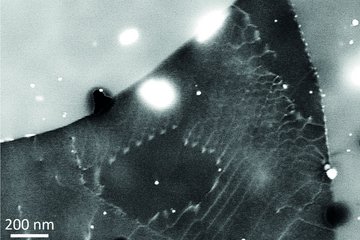All genres
61.
Talk
Are Mo2BC nanocrystalline coatings damage resistant? Insights from comperative tension experiments. 62. Metallkunde-Kolloquium, Werkstoffforschung für Wirtschaft und Gesellschaft , Lech am Arlberg, Austria (2016)
62.
Talk
Micro-scale fracture behavior of Co based metallic glass thin films. 2016 TMS Annual Meeting and Exhibition Symposium: In Operando Nano- and Micro-mechanical Characterization of Materials with Special Emphasis on In Situ Techniques, Nashville, TN, USA (2016)
63.
Talk
Fracture property characterization in brittle films and coatings. 42nd ICMCTF, San Diego, CA, USA (2015)
64.
Poster
Unravelling the atomic structure and segregation of Ʃ13 [0001] tilt grain boundaries in titanium by advanced STEM. Microscopy Conference 2021 & Multinational Conference on Microscopy 2021, Vienna, Austria (2021)
65.
Poster
Atomic structure and Fe-segregation in Ʃ13 [0001] Titanium tilt grain boundaries. PICO 2021 (Virtual) (2021)
66.
Poster
Microscopic study of a low temperature synthesized MoAlB coating by combinatorial direct current magnetron sputtering. Microscopy Conference, MC 2019, Berlin, Germany (2019)
67.
Poster
Phase transitions in Cr2AlC thin films by in situ TEM heating experiment. Fifth Conference on Frontiers of Aberration Corrected Electron Microscopy, PICO 2019, Vaalsbroek, The Netherlands (2019)
68.
Poster
Combining high strength and moderate ductility in wear resistant coatings: a Mo2BC study. Nanomechanical Testing in Materials Research and Development VI, ECI 2017, Dubrovnik, Croatia (2017)
69.
Poster
Nanostructure of Mo2BC thin films and the effect on mechanical properties. European Microscopy Congress 2016, Lyon, France (2016)
70.
Poster
Characterization of Mo2BC thin films by transmission electron microscopy methods. 2nd International Workshop on TEM Spectroscopy, Uppsala, Sweden (2015)
71.
Poster
Nanostructure and micromechanical properties of Mo2BC thin films. IAMNano 2015 Hamburg: International Workshop on Advanced and In-situ Microscopies of Functional Nanomaterials and Devices, Hamburg, Germany (2015)
72.
Thesis - PhD
Microstructure and grain boundary evolution in titanium thin films. Dissertation, Ruhr-Universität Bochum (2022)
73.
Thesis - PhD
Structural Analysis and Correlative Cathodoluminescence Investigations of Pr (doped) Niobates. Dissertation, Georessourcen und Materialtechnik, RWTH Aachen (2022)
74.
Thesis - PhD
Influence of Processing Parameters, Crystallography and Chemistry of Defects on the Microstructure and Texture Evolution in Grain-Oriented Electrical Steels. Dissertation, RWTH Aachen, Germany (2022)
75.
Thesis - PhD
Grain boundary segregation of boron and carbon and their local chemical effects on the phase transformations in steels. Dissertation, Faculty of Georesources and Materials Engineering of the RWTH Aachen, Germany (2021)
76.
Thesis - PhD
Design of Invar and Magnetic High-Entropy Alloys. Dissertation, RWTH Aachen University (2021)
77.
Thesis - PhD
Machine learning methods in data-driven nanostructure analysis of materials. Dissertation, RWTH Aachen University (2021)
78.
Thesis - PhD
Quantum mechanically guided design of mechanical properties and topology of metallic glasses. Dissertation, Fakultät für Georessourcen und Materialtechnik, RWTH Aachen (2020)
79.
Thesis - PhD
Design of materials with anomalous thermophysical properties and desorption-assisted phase formation of intermetallic thin films. Dissertation, RWTH Aachen University (2020)
80.
Thesis - PhD
Laser Additive Manufacturing of Oxide Dispersion Strengthened Steels and Cu–Cr–Nb Alloys. Dissertation, RWTH Aachen University (2019)











